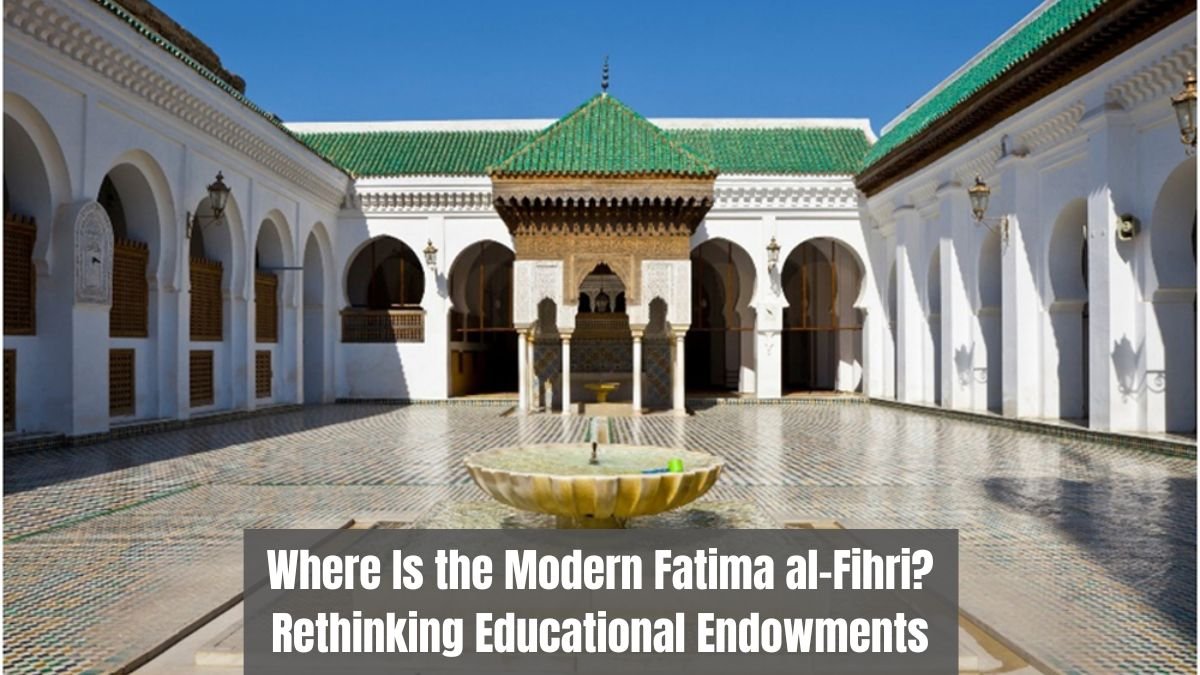On a Saturday evening walk through the narrow streets of Fez, my friend pointed to a small house and said, “Here lives the Fatima woman who gives 200 dirhams to each student of the Qarawiyyin University every year.”
I looked on in amazement. Another friend, who had once been a student at the university, smiled and said, “Seriously, I received this money myself. She also personally measures each student and makes their jullabas and shoes.”
I thought to myself – this is not charity, this is love. Love for knowledge, love for the students who receive it, and the selfless spirit to empower them.
We see a history of this kind of generosity in Muslim educational institutions, which have been dedicated to the dissemination of knowledge and the welfare of students for centuries.
Fatima al-Fihri and the University of Qarawiyyin
The Qarawiyyin Mosque and University, founded by Fatima al-Fihri in 245 AH, is still a symbol of education and knowledge. An ornate plaque reads: “Qarawiyyin Mosque – Established by Fatima al-Fihri.” Fatima’s initiative was not limited to religious education; it was also a strong social and cultural legacy.
Fatima’s sister, Maryam al-Fihri, was inspired by this great work and she too founded her own mosque and seminary in the city. Known as the Andalus Mosque, this institution too became a centre of education and research.
It was because of such personalities that the field of education flourished in the Muslim world for many centuries. There was a unique respect for knowledge. This love and respect was perhaps the force that inspired people to selflessly contribute to religious education.
Even today, students at the Qarawiyyeen University are able to receive their education because of such historic donations and endowments. It is a model where students can focus solely on studying and are not faced with financial constraints.
The Current State of Muslim Educational Institutions in North America
When we compare this to the Muslim educational institutions of modern North America, the situation appears extremely worrying. Many Islamic seminaries and educational institutions in the US and Canada are in financial trouble. Much of the time and energy of their leaders is spent on relentless fundraising events, donation efforts, and worries about meeting annual expenses.
There are many instances where scholars are forced to take on extra work due to financial problems. Some students return home after studying for years and work in places like shopping malls. Many employees work in such institutions without pay because of a lack of funds.
Some institutions with financial stability have started charging heavy tuition fees from students, making it difficult for ordinary students to access sacred education.
As a result, many students turn to foreign countries for higher education. This not only increases personal risk but also poses an economic burden. It is sad to see that the path of education, which was once open and accessible to all, is now limited to only a select few.
New ways of education with limited resources
Many scholars and teachers are currently forced to provide education through new and limited modes while maintaining the traditional system of education. For example, weekend seminars, summer intensive programs, and online courses are organized.
This system only caters to part-time students and their partial ambitions. Its academic output is relatively low compared to students who study seriously for a long time.
But still, this effort shows how deep the need for education is within the community and how strong the commitment of scholars is.
The role of the community in education
The story of individuals like Fatima al-Fihri reminds us how important community involvement is in education. Her donations and love kept the field of education stable and strong for centuries.
Today we have to ask the question – who is the modern-day Fatima al-Fihri? Can we create people in our community who will not only give money but also promote love and respect for education?
Without social and economic support, religious and higher education institutions will be limited to only a limited number of people. If we want our next generation to experience the fullness of knowledge and bring positive change to society, we must give both financial contributions and time.
The importance of selfless contribution to education
Not only donations, but also time and effort are invaluable in the field of education. It is important for teachers and scholars to have stability so that they can fully devote themselves to their knowledge and teaching.
It is also important for students to show full dedication in acquiring knowledge. An environment of mutual respect and love between teachers and students can be created only when the institutions are stable and capable.
Conclusion:
The story of Fatima al-Fihri and her sister Maryam teaches us that education is not limited to textbooks and exams. It can also be used to bring about change in society, promote culture and morality, and educate people.
